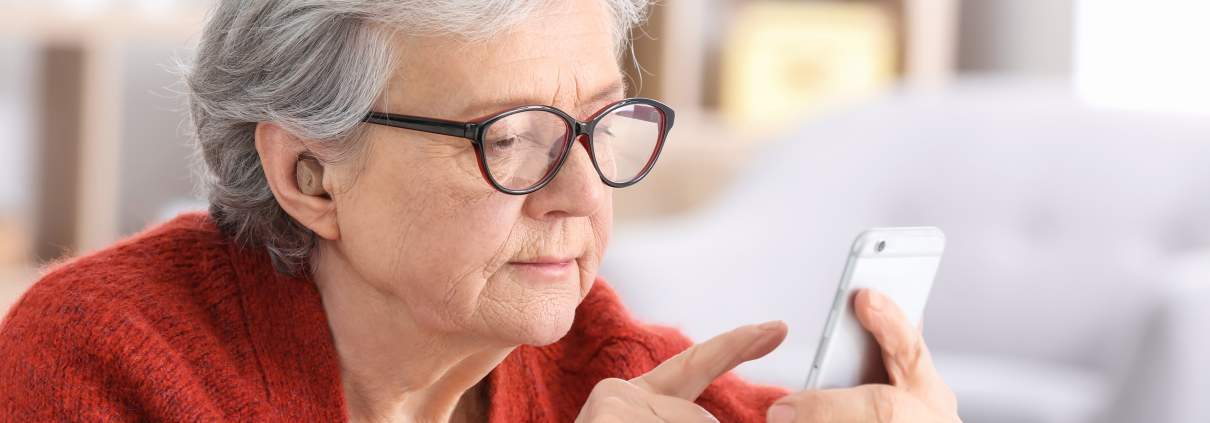Hearing Aids and Cell Phones
Would Your Hearing Problem Stop You From Using Cell Phones? Absolutely Not!
Is There a Mobile Phone Made for Hearing Loss?
For people with hearing loss, finding the right cell phone can be difficult. If you wear a hearing aid and need to talk on your cell phone, it can often come with interference noise. Worse, cell phones designed specifically for people with hearing loss or impairment have not be developed yet.
The good news: there are many modern cell phones that are compatible with hearing aids. Read on to learn more about hearing loss cell phones and other options available for you, a friend, or a family member.
What Are Hearing Aid-Compatible Cell Phones?
Hearing aid compatibility (HAC) is an important quality in cell pones for the hearing-impaired. Regular mobile phones are not compatible with hearing aids and cochlear implants. Not only that, but they are vulnerable to noise interference which occurs because of device incompatibility.
Hearing-aid-compatible cell phones have built-in protection against harsh noise and interference. They have a better performance compared to regular mobile phones. They can reduce disruption and noise, and maintain high-quality voice conversations.
Are All Cell Phones Compatible With Hearing Aids?
Short answer: No. Not all cell phones are hearing-aid compatible. But the good news is, you can find hearing-aid-compatible cell phones.
Your first option is to visit your local mobile shop. Ask about models that you prefer and that sync perfectly with your hearing aid. Your best option, fortunately, is to ask for professional help. First, ask your telecom service provider if they offer hearing-aid-compatible cell phone options. Or, you can ask your audiologist for recommendations.
Choosing the Best Cell Phone for Hearing Impairment
When choosing the best cell phone for you, your family, or for a friend who is hearing impaired, you have three options. Below are quick descriptions of these three. For the first two, these can used by people with hearing aids or have mild hearing loss. The last option is ideal for the deaf, and young people and seniors who are developing hearing loss.
Compatibility with Your Hearing Aid
Not all cell phones and mobile devices are hearing-aid-compatible. To find out which one, ask your audiologist. She/He would know which brand and type would be compatible with your hearing aid and condition. Your audiologist would be able to recommend one especially for you based on the medical assessment of your condition.
Another way is asking your telecom provider. Ask what options are available to you. They may be able to direct you to cell phones that are suitable for your needs and plan.
If you are canvassing cell phones yourself, choose the ones that have either an “M” or a “T” rating. The “M” rating refers to the cell phone’s compatibility with your hearing aid’s microphone setting. The higher the rating, the better. This is ideal if you prefer listening to a call with your cell phone in microphone mode. Most brands would only have an “M,” but some may be more specific and have “M3” or “M4,” etc.
The “T” designation refers to the connectivity between phones and hearing aids. Same with the “M” rating, the higher the cell phone’s rating (“T3” or “T4″), the better. Pick a cell phone with a rating of 2, at the very least, and above.
Amplified Cell Phones: Personalized Audio Settings and More
If you would like another option, check out amplified phones. This type is designed for people with hearing impairments, but who are not using hearing aids yet.
Amplified phones are specially designed phones. They have a wider volume range, pitch and tone control settings, as well as personalized speaking features. These settings are not found in regular mobile phones. They are designed to help people with hearing impairments to hear the person on the other end more clearly.
If you have a hearing aid and you want to use an amplified phone, you can still do. Amplified cell phones are compatible with hearing aids. They also have noise interference cancellation settings. You can set them for high and low pitches, reduce or increase white noise, and more.
Screen Size for Subtitle Reading
Caption cell phones are alternative options to hearing aid-compatible and amplified mobile phones. They use text instead of sound to transmit conversations. Get a caption cell phone with a large phone screen and you’re gold.
Caption cell phones don’t rely on sound and audio. This is why they are great alternatives to hearing aid-compatible and amplified cell phones. Caption cell phones are not as popular as the first two. But they are especially helpful for seniors, or for people who are deaf or have total hearing loss.
Stay in Touch With the Cell Phone That’s Compatible with Your Needs
For those with hearing loss, staying in touch with loved ones and friends can be a challenge. But having the right cell phone, one that is compatible with their hearing aids and needs, is a big help.
Numerous studies have shown that people living with hearing impairments can feel isolated. Because of this, they may have a higher chance of developing depression. Communication is important and cell phones for the hearing impaired highlights this. So don’t worry: you will find the right cell phone for your needs. Get in touch with your audiologist to get a professional opinion and you’re halfway to finding the best cell phone to suit your hearing needs.



